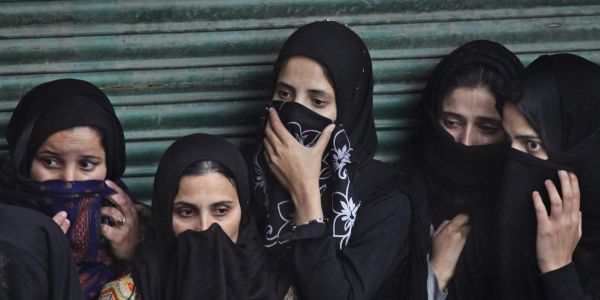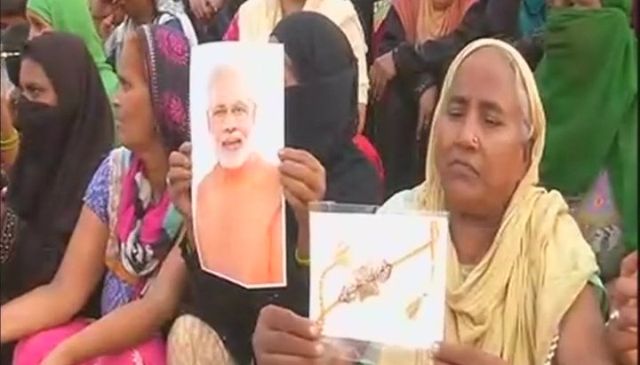
by Editor | May 25, 2021 | News, Politics
 By Anjali Ojha,
By Anjali Ojha,
New Delhi : The proposed bill that criminalises the practice of instant divorce “empowers” Indian Muslim women by giving them a larger say in dissolving marriages, custody of minor children and the right to seek maintenance from their estranged husbands, according to the cabinet-cleared controversial legislation opposed by Muslim groups.
The bill defines triple talaq as “any pronouncement (of divorce) by a person upon his wife by words, either spoken or written or in electronic form, or in any other manner”. It proposes to make the practice a punishable offence and is set to be introduced in the Lok Sabha next week.
IANS has exclusive access to a copy of the cabinet-cleared version of the legislation drafted after the Supreme Court’s decision against the gender-discriminatory practice that is not followed even in major Muslim countries, including Saudi Arabia, Egypt and Pakistan.
The draft bill says the practice against “constitutional morality” and “gender equity” is to be considered “void and illegal”.
Anyone who pronounces instant divorce “shall be punished with imprisonment for a term which may extend to three years and a fine”, the bill proposes.
In its statement of objects and reason, the draft mentions the landmark Shayara Bano case in which the Supreme Court invalidated the practice of instant triple talaq. The statement would be read by Law Minister Ravi Shankar Prasad when he introduces the bill in the Lok Sabha to explain why the government had to formulate the legislation.
Shayara Bano, a 38-year-old woman from Uttarakhand, fought a long legal battle seeking an end to the the patriarchal custom after she claimed to have suffered for 14 years in her marriage.
“This judgement gave a boost to liberate Indian Muslim women from the age-old practice of capricious and whimsical method of divorce, by some Muslim men, leaving no room for reconciliation,” the minister says in the bill’s statement of objects.
The judgment vindicated the position taken by the government that “talaq-e-biddat”, which allows men to pronounce divorce thrice in one sitting, is against “constitutional morality, dignity of women and the principles of gender equality, as also against gender equity guaranteed under the Constitution”.
Clerics and several Muslim organisations, cutting across sects and schools of jurisprudence, protested against the Supreme Court judgment and termed the government’s stand as “uncalled for interference” in the personal laws of the community.
Ravi Shankar Prasad, however, in the bill’s objects and reasons says the All India Muslim Personal Law Board (AIMPLB), which was also a respondent in the Shayara Bano case, had contended that it was not for the judiciary to decide matters of religious practices such as talaq-e-biddat but for the legislature to make any law on the same.
“They had also submitted in the Supreme Court that they would issue advisories to the members of the community against this practice,” the minister explains.
The bill notes that “there have been reports of divorce by way of talaq-e-biddat from different parts of the country” even after the Supreme Court invalidated the practice and the assurance by AIMPLB.
“It is seen that setting aside talaq-e-biddat by the Supreme Court has not worked as any deterrent in bringing down the number of divorces by this practice among certain Muslims. It is, therefore, felt that there is a need for State action to give effect to the order of the Supreme Court and to redress the grievances of victims of illegal divorce,” the minister says.
The bill states that urgent suitable legislation was necessary “to give some relief to…the hapless married Muslim women who suffer from harassment due to talaq-e-biddat.
“This is essential to prevent this form of divorce, wherein the wife does not have any say in severing the marital relationship.
“The legislation would help in ensuring the larger constitutional goals of gender justice and gender equality of married Muslim women and help subserve their fundamental rights of non-discrimination and empowerment.”
(Anjali Ojha can be contacted at anjali.o@ians.in)
—IANS

by Editor | May 25, 2021 | News, Politics
 New Delhi : A bill on making Triple Talaq a punishable offence and another one to give constitutional status to the backward classes panel is set to be introduced in the Lok Sabha next week, Parliamentary Affairs Minister Ananth Kumar said on Thursday.
New Delhi : A bill on making Triple Talaq a punishable offence and another one to give constitutional status to the backward classes panel is set to be introduced in the Lok Sabha next week, Parliamentary Affairs Minister Ananth Kumar said on Thursday.
The Muslim Women (Protection of Rights on Marriage) Bill, 2017, provides for three-year imprisonment and fine for men who orally divorce their wives and also gives such Muslim women the right to seek maintenance.
The Constitution (123rd Amendment) Bill pertains to conferring constitutional status on the National Commission for Backward Classes.
The bill, passed by the Lok Sabha in April, was sent to the Rajya Sabha which passed the bill with amendments. Hence, the government will now reintroduce the bill.
“In case of a constitution amendment bill, the Lok Sabha and the Rajya Sabha cannot differ. So the bill has to be reintroduced,” the Minister said.
Government sources said some minor changes were made to the bill.
—IANS

by Editor | May 25, 2021 | News, Politics

For representational purpose only
New Delhi : A bill seeking to criminalise instant triple talaq among Muslims and providing for a three-year jail term was cleared by the Union Cabinet on Friday, which the government said was aimed at protecting the dignity and security of women in the community.
The Muslim Women (Protection of Rights on Marriage) Bill, 2017 got the cabinet nod at a meeting chaired by Prime Minister Narendra Modi, who had spoken about the issue even during the campaign of the just-ended Gujarat Assembly elections.
Law Minister Ravi Shankar Prasad refused to give details of the Bill at a media briefing on the ground that Parliament was in session. He merely said many state governments, to whom the draft of the bill was sent, had supported the Bill.
According to the draft Bill sent out to states earlier this month, it was proposed that triple talaq be made a cognisable and non-bailable offence that would attract a jail term of three years. The draft law was prepared in the backdrop of the August 22 verdict of the Supreme Court striking down the practice of “instant” triple talaq as illegal.
However, it is understood that the Bill provides for a three-year imprisonment and fine to a Muslim man if he resorts to the practice of instant divorce, which a five-judge bench of the Supreme Court had held as “unconstitutional and arbitrary”. The court had also held that triple talaq was not integral to Islam.
The Bill, while making instant divorce a cognisable and non-bailable offence, also seeks to give the affected women right to seek maintenance. It is expected to be introduced during the Winter Session of Parliament that commenced on Friday.
Declining to go into the details of the measure, Prasad said it was designed to shield the helpless victims of triple talaq and to give them dignity and security.
“Cabinet has taken historic decisions today which will have a long term impact in the growth of the country… because Parliament session is on, I cannot give details of the Bill,” he said.
“We approved The Muslim Women (Protection of Rights on Marriage) Bill, which is to protect victims of Triple Talaq,” he added.
The Cabinet clearance was criticised by the All India Muslim Personal Law Board as a direct attack on the religious freedom of the Muslim community, while women activists sought collective support of political parties in converting the Bill into law.
Opposing the bill, AIMPLB member Maulana Khalid Rashid said: “As far as the compensation for the rehabilitation of the women is concerned, they are already being given by the Muslim community. So, the triple talaq bill, we consider as a direct interference in the religious matters of the largest community. It is an attack on religious freedom…”
“Women are not being tortured in the name of triple talaq. Muslim women have said they do not want change in the personal law including the law of triple talaq. If certain people are misusing certain laws it doesn’t mean that you will completely finish that law. It is part of our ‘sharia’. The government should at least have consulted Muslim organisations before making any such law,” he said.
Activist Zakir Soman said the Muslim Personal Law Board and the Muslim community are not taking proper care of triple talaq victims, and such women should be given justice as per law.
“If the community and the Personal Law Board was doing enough why would be the women (triple talaq victims) be coming to women’s organisation?,” asked Soman.
“The community is indulging in argument but that doesn’t mean we will give up our constitutional and legal entitlement. We are all citizens in a democracy and living in the 21st century. We are entitled, educated and empowered, and we want justice as per the law of the land…So, this kind of Personal Law Board argument for any kind of reform is not accepted,” the activist said.
According to Soman, they have written letters to Congress President-elect Rahul Gandhi and other opposition leaders, including West Bengal Chief Minister Mamata Banerjee, former Uttar Pradesh Chief Minister Akhilesh Yadav and CPI-M General Secretary Sitaram Yechury for their collective support in converting the triple talaq Bill into when it is tabled in the Winter Session of Parliament for discussion.
“Through the letter, we requested the leaders to come together in order to solve the issue. It is not the matter of BJP, Congress or any other political parties. It is the responsibility of political parties, its representatives and all the women of this country,” she said.
Another women activist Hina Zaheer said: “According to the Quran, there is no provision for instant talaq… So, it should not be the matter of ego for the Muslim Personal Law Board. The board should have solved it by themselves. They haven’t solved it, that is why lot of politics is being done over the issue.”
—IANS

by Editor | May 25, 2021 | News, Politics

Bharatiya Muslim Mahila Andolan (BMMA)
Mumbai : The Bharatiya Muslim Mahila Andolan (BMMA) on Friday urged all opposition leaders, including Congress President-elect Rahul Gandhi, to extend their support for the proposed Muslim family law.
In a letter to Gandhi and other major Opposition parties, the BMMA founders – Zakia Soman and Noorjehan Niaz – said that although the Supreme Court has struck down ‘Triple Talaq’ in its judgement last August, other issues like ‘nikah halala’, polygamy, age of marriage, custody of children, etc, remain unaddressed.
The BMMA has been actively raising these issues to end the legal discrimination and demanding justice and equality in family matters which are orthodox, patriarchical and male-dominated, they said.
The males have stonewalled all attempts towards reforms in the Muslim Personal Law and Muslim women have been denied their Quranic rights as as well as their rights as equal Indian citizens.
“Among all Muslim countries in the world, such as Morocco, Tunisia, Turkey, Egypt, Jordan and even Bangladesh and Pakistan in our neighbourhood have codified personal laws governing marriage and family matters. But Indian Muslim women have been denied protection of law,” said Soman and Niaz.
They pointed out a 2015 research study where 92.1 percent of all Muslim women sought a total ban on oral/unilateral divorce and 91.7 percent opposed polygamy, while 83.3 percent felt that codification of Muslim family law would help Muslim women get justice.
In its grassroots work in different parts of India, the BMMA has found that just as Hindus, Christians and Parsis have their own personal laws and Muslims must also have a similar personal law ensuring equality and dignity to their womenfolk.
The two activists said that this can be achieved either through amendments to the Shariat Application Act, 1937 and Dissolution of Muslim Marriages Act, 1939, or by enacting a completely new Muslim Personal Law with the desired reforms.
The BMMA has already prepared a draft on this based on Quranic tenets concerning age of marriage, mehr, talaq, polygamy, maintenance, custody of children, etc, which in consonance with the Constitution.
The draft suggests that the minimum marriage age for girls and boys be 18 and 21 respectively, consent of both sides without force or fraud for marriage, minimum ‘mehr’ to be equivalent to one full annual income of the groom to be paid at the time of solemnising ‘nikaah’.
Besides, the BMMA draft says talaq’should precede a mandatory arbitration over a 90-day period and polygamy should be declared as illegal, while ‘halala’ and ‘muta marriage’ should be made punishable offences.
On children, it seeks that both the mother and father be declared as natural guardians of the child, and custody of children be based on the best interests and decision of the child.
Similarly in property matters, the Quranic shares to be applied while making will or clearing debts for ensuring justice to the women.
—IANS

by Editor | May 25, 2021 | News, Politics
 New Delhi : In a letter written to Law Minister Ravi Shankar Prasad on Tuesday, a Muslim body has demanded that the triple talaq or instant divorce should be made an offence under the Domestic Violence Act and should not be criminalised.
New Delhi : In a letter written to Law Minister Ravi Shankar Prasad on Tuesday, a Muslim body has demanded that the triple talaq or instant divorce should be made an offence under the Domestic Violence Act and should not be criminalised.
In its letter to Prasad, the Indian Muslims for Secular Democracy (IMSD), an NGO, said it supported a legislation to declare instant triple talaq an illegal act, but “strongly opposes” any move by the government to criminalise the practice, punishable with three years in jail plus fine.
“The IMSD fully supports the need for a legislation dealing with abolition of triple talaq. It also recognises the need for penal provisions in the Act so that Muslim men realise that committing the illegality of triple talaq will henceforth have serious consequences. However, the IMSD is not convinced that the solution lies in a straight-forward, single-step criminalisation of the instant divorce practice,” the letter read.
“Moreover, we are seriously concerned with the fact that the draft bill — Muslim Women (Protection of Rights on Marriage) Act — makes triple talaq a non-bailable offence punishable with a jail term of three years and fine. The IMSD is concerned with the serious implications of a single-step criminalisation of triple talaq for several reasons,” it added.
The letter pointed out that since the socio-economic status of the majority of Muslims was low, the case expenses and the subsequent jail term if convicted would leave the erring husband finacially devastated.
“Also, the woman victim of triple talaq too must find money to hire a lawyer to press for her claims of maintenance, child custody, etc. Where will a husband in jail for three years find money to pay for the maintenance of his wife and children?” it said.
“For these reasons, the IMSD is of the view that all things considered, the proposed new law may simply provide that triple talaq, which is illegal, will be treated as ‘domestic violence’ as defined under the secular Protection of Women from Domestic Violence Act 2005.
“Once the Domestic Violence Act kicks into place, it immediately opens up the possibility of various reliefs provided under the Act for a victim of triple talaq. These include protection against violence, right to residence in the marital home, maintenance, medical facility, compensation…,” it said.
The letter stressed that the proposed law should declared triple talaq procedure as illegal and not talaq (divorce) per se.
The IMSD said that any legislation dealing with the issue of triple talaq should be comprehensive and lay down the entire correct procedure of pronouncing talaq in accordance with the Islamic law instead of only penalising the practice.
—IANS





